
The Farabundo Martí National Liberation Front is a Salvadoran political party and former guerrilla rebel group.

The Chapultepec Peace Accords were a set of peace agreements signed on January 16, 1992, the day in which the Salvadoran Civil War ended. The treaty established peace between the Salvadoran government and the Farabundo Martí National Liberation Front (FMLN). It was signed in Chapultepec Castle, Mexico.
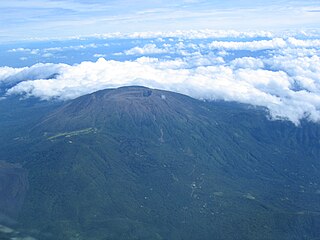
The Santa Ana Volcano or Ilamatepec is a large stratovolcano located in the Santa Ana department of El Salvador. At 2,381 metres (7,812 ft) above sea level, it is the highest volcano in the country. It is located immediately west of Coatepeque Caldera.

Consuelo, comtesse de Saint-Exupéry, was a Salvadoran-French writer and artist, and was married to the French aristocrat, writer and pioneering aviator Antoine de Saint-Exupéry.
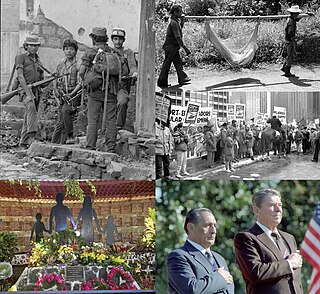
The Salvadoran Civil War was a twelve-year civil war in El Salvador that was fought between the government of El Salvador and the Farabundo Martí National Liberation Front (FMLN), a coalition of left-wing guerilla groups backed by the Cuban regime of Fidel Castro as well as the Soviet Union. A coup on 15 October 1979 followed by government killings of anti-coup protesters is widely seen as the start of civil war. The war did not formally end until after the collapse of the Soviet Union, when, on 16 January 1992 the Chapultepec Peace Accords were signed in Mexico City.

Colombia–France relations are the bilateral relations between Colombia and France. Both nations are members of the OECD and the United Nations.

Diplomatic relations between the Argentine Republic and the Republic of El Salvador have existed for over a century. Both nations are members of the Community of Latin American and Caribbean States, Group of 77, Organization of American States, Organization of Ibero-American States and the United Nations.

United Nations Security Council resolution 961 was adopted unanimously on 23 November 1994, after recalling resolutions 637 (1989), 693 (1991), 714 (1991), 729 (1992), 784 (1992), 791 (1992), 832 (1993), 888 (1993) and 920 (1994), the council discussed the implementation of peace agreements in El Salvador and extended the mandate of the United Nations Observer Mission in El Salvador (ONUSAL) for a final time until 30 April 1995.
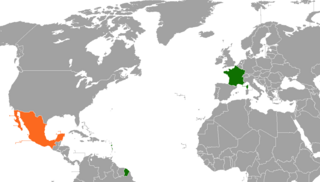
The nations of France and Mexico established diplomatic relations in 1830. Initially, relations between both nations were unstable as a result of France's first and second interventions in Mexico. During World War II Mexico did not recognize Vichy France, instead it maintained diplomatic relations with the French government in exile in London. Diplomatic relations were restored between both nations at the end of the war in 1945 and have continued unabated since.

El Salvador and Uruguay share a common history in the fact that both nations were once part of the Spanish Empire. Formal diplomatic relations were established in 1929. Both nations are members of the Community of Latin American and Caribbean States, Group of 77, Organization of American States, Organization of Ibero-American States and the United Nations.

The nations of El Salvador and Mexico established diplomatic relations in 1838. Both nations are members of the Association of Caribbean States, Community of Latin American and Caribbean States, Organization of American States, Organization of Ibero-American States and the United Nations.

The Truth Commission for El Salvador was a restorative justice truth commission approved by the United Nations to investigate the grave wrongdoings that occurred throughout the country's twelve year civil war. It is estimated that 1.4 percent of the Salvadoran population was killed during the war. The commission operated from July 1992 until March 1993, when its findings were published in the final report, From Madness to Hope. The eight-month period heard from over 2,000 witness testimonies and compiled information from an additional 20,000 witness statements.

El Salvador and India have maintained diplomatic relations since 1979. El Salvador maintains an embassy in New Delhi and an honorary consulate in Bangalore. The Embassy of India in Guatemala is jointly accredited to El Salvador. India also maintains an honorary consulate in San Salvador.

El Salvador and Spain have long-standing cultural and diplomatic relations, owing to the history of the Spanish Empire. Bilateral relations between the two as sovereign states began in 1865. Both nations are members of the Association of Academies of the Spanish Language, Organization of Ibero-American States and the United Nations.
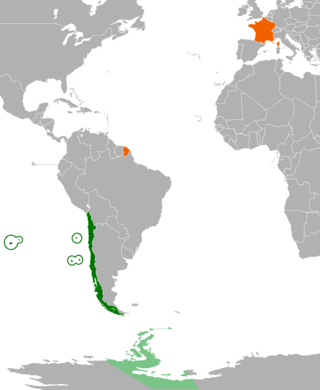
Chile–France relations are the diplomatic relations between Chile and France. Both nations are members of the Organisation for Economic Co-operation and Development, United Nations and the World Trade Organization.

France–Peru relations are the diplomatic relations between the French Republic and the Republic of Peru. Both nations are members of the United Nations and the World Trade Organization.

Diplomatic relations between Canada and El Salvador were established in 1961. Both nations are members of the Organization of American States and the United Nations.

El Salvador and Peru share a common history in the fact that both nations were once part of the Spanish Empire. Formal diplomatic relations were established in 1857. Both nations are members of the Community of Latin American and Caribbean States, Group of 77, Organization of American States, Organization of Ibero-American States and the United Nations.
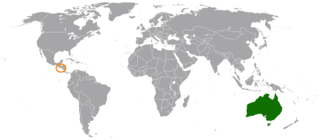
Current and historical relations exist between the Commonwealth of Australia and the Republic of El Salvador. Both nations enjoy friendly relations, the importance of which centers on the arrival of Salvadoran refugees to Australia during the Salvadoran Civil War. There is a community of approximately 20,000 people of Salvadoran origin in Australia. Australia is home to the third largest Salvadoran community living abroad. Both nations are members of the Forum of East Asia–Latin America Cooperation and the United Nations.





















